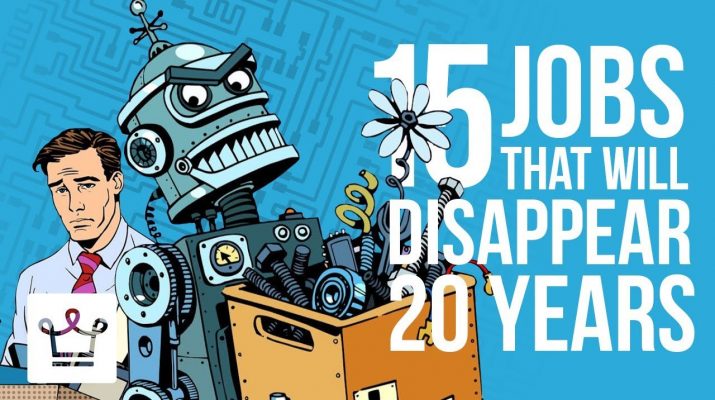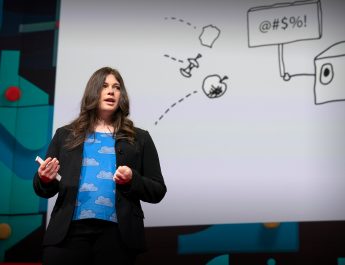I know that for some, the future is incredibly exiting, filled with new technology and new opportunities but for some others, the future doesn’t look as bright and I wan’t to raise some concerns with you. A study done at Oxford University found out that 45% of all current jobs will disappear in the next 10 years with some of them being completely automated or at least upgraded to a point where a fraction of the work force is needed. This will greatly impact the way you plan for your future as the environment is changing.
1. DRIVERS
Let me put it this way: if your job consists of driving any type of machinery, automobile or vehicle, you’re gonna be out of a job soon. Taxi drivers, bus drivers, truck drivers, Uber drivers and delivery drivers are all on the verge of complete automation. In the US alone there are 15.5 million trucks and 2 million tractor trailers on the road. With the trucking industry employing 14 million people out of which 10 million are drivers. These are the people that are going to be pushed out first because a self-driving truck doesn’t need to stop for rest fis attentive to the road 24/7 and we already have the technology. Believe it or not, this is already backed by the government in Germany and they’re betting hard on self-driving trucks. Above that we know that the next generation of Tesla cars will be 100% autonomous. Elon Musk himself agrees that it will take us one to two years to get the tech right and then three more to get the government to approve it. All major car manufacturers are headed towards electric and self-driving cars and those who won’t will be left behind. In the near future, riding in a car will be like getting in an elevator. You just press a button and it takes you to wherever you want to go. Now what’s going to happen to the estimated 20 million to have their livelihoods based on being active drivers? These people will need to reinvent themselves multiple times in a row. This might be easy if you’re currently 20 to 30 years old but what will a 50+ year old taxi driver be able to readapt to. Not sure what these people will be able to do to switch from taxi driving to 3D modeling for virtual worlds but we’ll see.
2. FARMERS
Farming was huge when it came to employment numbers back in the day. This changed dramatically. You might still see farming as human labor intensive in the underdeveloped parts of the world, but on a macro level, this has already been automated with very few specially trained individuals that operate heavy machinery from the comforts of the office via wireless connections. Back in the day you needed to physically measure your plot of land, needed human labor to weed it our and another set of people to harvest and transport the end product to where it’s needed. Now we measure things with drones or satellite imagery. The soil is already treated against weeds or the seeds are weed resistant to begin with. Harvesting and planting can be done in a small fraction of the time it used to thanks to specialized hardware and the trucks carrying out will be self-driving really soon. Bearing the title of farmer in the near future will be as highly ranked as banker or hedge fund manager since they’ll only be a handful of people having the oligopoly when it comes to what you eat. If this sounds ridiculous to you that only a few people will be in charge of our food, you’re already too late to the table. Today only 10 companies control almost every large food an beverage brand in the world. Anything you eat, probably comes from one of them. These companies: Nestle, PepsiCo, Coca-Cola, Unilever, Kellogs’s, Mars, etc. Welcome to the future!
3. PRINTERS AND PUBLISHERS
The newspaper is dead. Traditional media is suffering as the Internet is eating up everything. You no longer need to get your news from the papers, you get them via Twitter or live streams as they are happening. All traditional magazines are fighting for their lives not to survive one versus the other, but to survive as a whole. Despite having a strong brand, they’re on the verge of collapse, despite their massive push into digital media. Information is free and there are very few publishers where the trust in the brand is enough to keep the motors going. A great example is the New York Times, one of the only poblications who have successfully implemented a paywall for readers to consume their written content. With a democratization of new sources, big brands are struggling to find their place in this online first environment. Unless you’re in your 50s or more, you’re unlikely to get your news from TV networks. While Trump is watching Fox News, we’re here backing Youtubers on patreon.
4. CASHIERS
America alone has 8 million people working as cashiers and in-store sales people. These people are going to be out of a job sooner then they think. I know you’ve seen the self checkout stations and they still have someone supervising them and they’re bugging now and then but we’re not far from a total takeover of the machines in this space. If you’ve been following what the biggest commerce giants are doing, it’s easy to connect the dots. Amazon acquired Whole Foods for close to fourteen billion dollars. The Same Amazon is running pilot tests with what they call “Amazon Go”. A corner store with zero humans involved where you just walk in, get what you need and walk out. With everything you bought being autmomatically deducted from your credit card, sensors are on the rise and the tech needs only to be a little better than the human counterpart for the switch to be made. Also the AI cashiers can go 24/7 without bringing the drama of their personal lives into the workplace.
5. TRAVEL AGENTS
When is the last time you went to a travel agency to book a flight? The likes of Skyscanner took over the flight ticket industry. Booking.com over the hotel booking industry and Airbnb is distrupting the hotel business as a whole. There’s no need for a third person to book the flight or hotel room for us. We can do it ourselves. You can also tell Siri to book it for you.
6. MANUFACTURING WORKERS
When the Industrial Revolution hit, all the people working the fields moved to work in factories. Handcrafting the machines that would make our lives easier. In the process and with the advancement in technology, these same people were put in charge of building machines that build other machines that would eliminate the need for humans. A fun thing to do is to compare the way cars were built less then a hundred years ago in the factories of Volkswagen and how they’re built today. Back then, multiple humans were working in tandem to put together the end product, while today you’re watching simple software at work. I heard this great quote a while back that’s stuck with me and it goes like this: “The factory of the future will only have one human and one dog. The human will be there to feed the dog and the dog will be there to keep the human from touching the machines.”
7. DISPATCHERS
I know you’re probably thinking of the days when someone had to manually connect you to a different line in order to talk to someone but an astonishing number of people are still working as dispatchers today. The role of the dispatcher is to coordinate the field operators so things run smoothly for everybody. It doesn’t matter if you’re a firefighter dispatcher working with planes, the police or ambulances. We already have technology that is massively outperforming you at your job and we’re now figuring out just the final touches on what is the best way to deploy that technology. Remember only five years ago when you had to call someone and aks for a cab? How do you ask for an Uber or a lift today: One algorithm making their way into your particular niche of dispatching and your job is over.
8. WAITING TABLES AND BARTENDING
Okay, not all of them will be gone, but the bulk surely have one foot out the door already. Of course there’s a need for social interaction but that’s not always the case. Sometimes you just want to sit down, have the food arrive at your table as soon as possible, enjoy a particular mix of alcoholic beverages and then leave. All of which can be successfully replaced by a carefully documented algorithm and an iPad. More and more restaurants are jumping in on this trend all around the world.
9. BANK TELLERS
I’m sad to say this, as the lady at my bank has always been so nice to me. But we’re not going to the bank for social interaction. To be honest, we don’t go to the bank anymore or very rarely when a visit is really needed. Otherwise we check out our balance on our smartphones. Even the people on our payroll get their money delivered to their accounts automatically, without the need for us to manually and physically fill in a form with their details. If you want to grab cash you go to an ATM. You can open a bank account to most banks in the world online and only if you’re looking for specialize services, you might need to meet in person and even then you might get the job done with a video call.
10. MILITARY PILOTS AND SOLDIERS
The military is the most sensible industry to innovation. It is the first one to embrace it and deploy it. If back in the day wars were decided based on who had the largest number of troops, today it’s a technology play. You no longer see people holding bayonets and riding horses into battle, because that would be inefficient. Drones can hit a target more accurately than any human could without endangering the life of the pilot who’s sitting comfortably in a chair on the other side of the world. There is still a need for human soldiers but not as we know them. These are the special ops. The best of the best, who are deployed only when there’s no other technology at play.
11. FAST FOOT WORKERS
Remember when people were asking for $15 an hour to work at McDonald’s? That’s when automation kicks in. All the people portesting the low wages for unskilled jobs will be the first ones to be hit if such an increase in pay does happen. Fast food jobs are probably the easiest to automate out of the list and to be honest, it would’ve happened anyway but companies didn’t do it right away, because they didn’t have any incentive to mess with some that’s working fine right now, but now with all the protests, the government might actually give in and that’s when the wave of automation takes over.
12. TELEMARKETER
Have you noticed that there are already fewer and fewer telemarketers? Their entire industry has been taken over by targeted ads all around the internet and on all of your devices. These ads are specially constructed, base on the information the tech giants have gathered from your use on their platforms. Facebook is not a charity. It uses all the data for the things you like, click on, share or engage with to create a custom profile for every single one of its users. Batch them and sell them to other companies. Ads are getting smarter as they learn more and more from you and that’s why telemarketers are obsolete.
13. ACCOUNTANTS AND TAX PREPARERS
If it’s one thing we’ve learned so far from this list is that boring and repetitive jobs will be taken over by algorithms. What’s the role of an accountant? To go through your raw data and organize it. That’s like the favorite thing to do for algorithms. That’s where they shine! The average accountant in the US earns around $60.000 per year and there are 1.3 million registered accountants and auditors. Even if it would cost 15 billion dollars to create a highly sophisticated AI, that would get the job done perfectly, that piece of software would pay for itself in under two years! That’s why AI engineers are going after accountants, lawyers and medical professionals
14. STOCK TRADERS
Long are the days of Jordan Belfort and Gordon Gekko. A study done by Bloomberg analysts in late 2015 discovered that only 10% of the stocks traded on a daily basis worldwide, are traded by actual humans and investors. The rest are BOTS. Wherever there’s money, someone will try to automate it and get an edge against their competitors. The stock market is one of those places and the people behind the biggest funds in the world have deep enough pockets to capitalize on it. Want to be freaked out? Okay, let’s say you want to buy a particular stock. You go to your favorite trading platform or secured porfolio management dashboard, you fill in the info with how much you want to buy at a trading price and hit “buy”. In the time it takes for the single to reach the servers and approve the order, the bots have already realized you’re going to purchase that stock. They buyt it for themselves, trade it between themselves and then sell it to you at a bigger price. Welcome to the world of micro trading, where bots always win.
15. CONSTRUCTION WORKERS
Back here on earth, where people actually use their hands and backs to make things happen. There are at least 200 million people working in construction around the world and with developing countries, wanting to expand, you’d expect a number to be on the rise. well, it isn’t and that’s because technology is getting more and more efficient and affordable. Developers now need more machines and a slightly more specialize workforce to use the machines to build. As technology progresses, we can see that construction workers will follow the same path as those who used to work in the farming industry in the past. Unless you’re the owner of the enterprise or one of those specialized employees who are further down the line of automation, the future doesn’t seem like a welcoming place for you.
https://steemit.com/technology/@wobbl/15-jobs-that-will-disappear-in-the-next-20-years-due-to-ai




